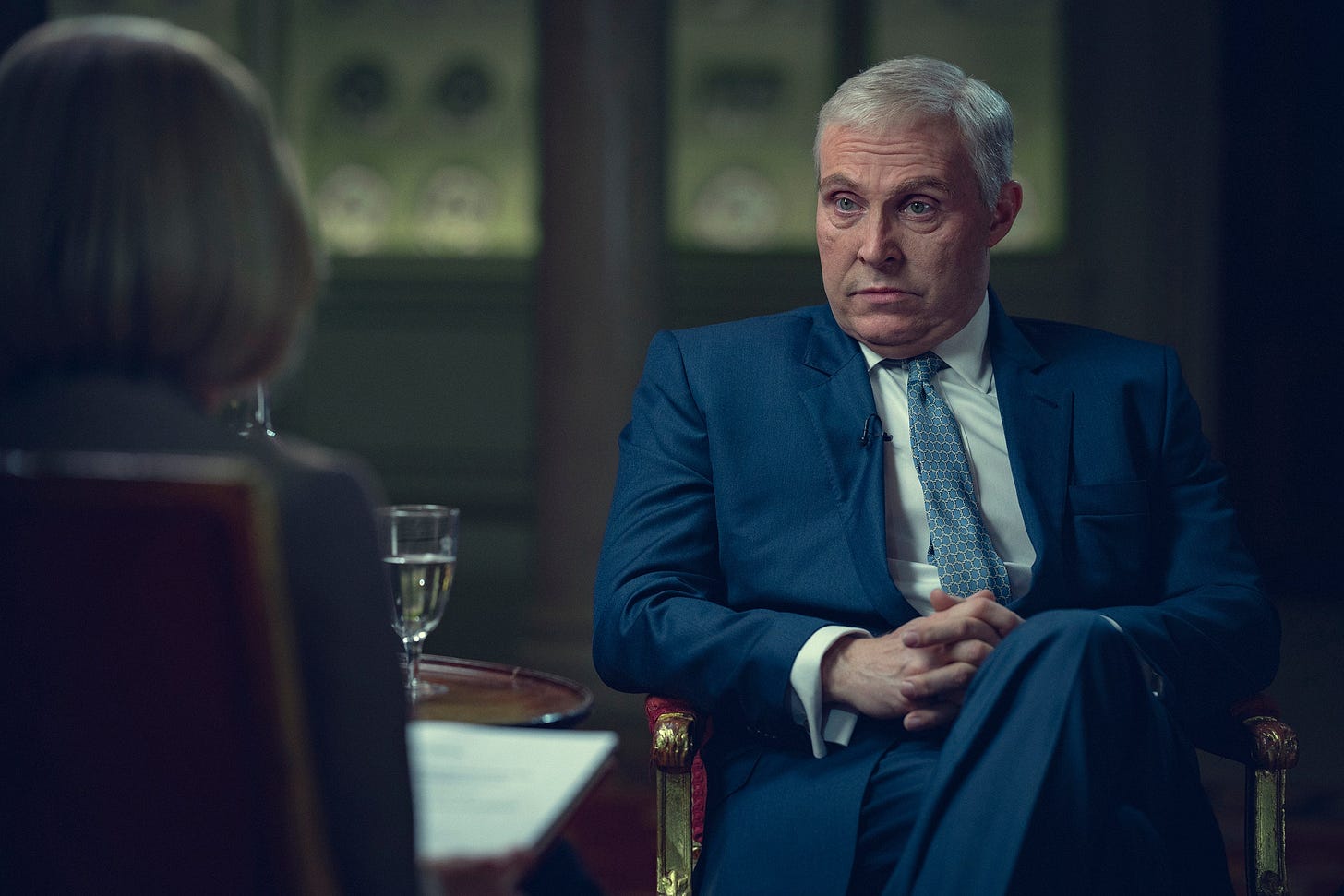All The Newsnight's Women
Netflix's interview drama was almost as puffed up as the Prince at its centre.
The newsletter will be back on a twice and week schedule from Monday. Thanks for sticking with me.
Previously: Ofcom closes barn door, points at the horse in the distance.
It starts with the title: What was the scoop at the heart of Scoop? Getting Prince Andrew to talk on camera was a coup but the catalyst for it was stories broken by other outlets, and while the interview itself featured striking details — chiefly that unrequited brand partnership for Pizza Express — it actually told viewers nothing new. The women abused by Jeffrey Epstein were silent characters papped leaving his New York home or pinned to the wall in the sparse office where the Newsnight team prepared for the interview. Scoop is not their story.
It’s not even the story of Emily Maitlis, who conducted the interview (that’s coming soon from Amazon). Or even Prince Andrew, the subject of the interview. It’s a universe in which every object revolves around Newsnight’s then guest booker, Sam McAlister, whose memoir, Scoops was adapted for the film. There’s a strong argument for more films and television about journalism that focus on the role of people behind the camera but Scoop is myopic in its desire to make McAlister the singular driving force behind the interview and to hugely over-play the significance of the event.
“An hour of television can change everything,” intones Billie Piper as McAlister, in one of several egregious examples of telling and not showing in the drama. What changed after the Newsnight interview? Prince Andrew lost some titles and had to ‘step back’ from spongeing off the public purse to a life of pampered mooching about in private. He was pointedly pictured doing some of that mooching on horseback yesterday.
The performances are Scoop’s strength. While it suffers a little from residual hints of Thatcher, Gillian Anderson’s take on Emily Maitlis is occasionally spookily accurate and Rufus Sewell is spectacular as self-pitying, arrogant, and saggy arsed Andrew. The ‘plot’ is the problem. When you know that the Newsnight team will get its chance to challenge the Prince and that McAlister will be vindicated, any tension the script attempts to produce can only feel hollow.
There are also just many moments where the drama tips over into sheer schmaltz, whether it’s a barely-bothered-with sub-plot about McAlister’s parenting becoming semi-detached as she obsesses over the ‘scoop’ or Newsnight editor Esme Wren’s stirring “this is what we do” speech. Scoop lacks sharpness and cynicism. While there is heavy-handed tension between the Mail-loving McAlister and her cardboard cutout Guardian reader colleagues in the Newsnight office, they all end up spouting dialogue that sounds like a Media Studies textbook pushed through ChatGPT.
Scoop wants to be All The President’s Men or Frost/Nixon but the ‘enemy’ here is an idiot surrounded by sycophants. There’s no real sense of threat or reason for paranoia among all Newsnight’s women, beyond a brief and quickly dismissed suggestion that the Palace might get at the BBC top brass to put a stop to the broadcast.
The drama’s recreation of the interview is faithful and that’s another problem because you can still watch it in full on iPlayer. Despite Sewell’s sensational impersonation — aided by powerful prosthetic jowls — its a rather empty experience. You see palace functionaries on the sidelines and the looks the Newsnight team exchange with them but it all feels lacking in any sort of additional perspective. In line with the in-universe smugness of the journalistic backslapping, it feels as though the makers of the drama are far more delighted with their recreation than any viewer ever could be.
Scoop doesn’t take Epstein’s crimes seriously enough while treating the process of phoning up Prince Andrew’s press secretary (solidly by Keeley Hawes) and basically saying, “What about now?” as though it is an act of breathtaking bravery. Evelyn Waugh’s 1938 novel remains the rightful owner of the name Scoop because it shows the cynicism, ego, and self-satisfaction that is as much a driving force of journalism as the desire to seek out the truth and shine light on dark secrets.
There are a strange implications about the purpose journalism at the heart of Scoop that are not remotely adequately explored. McAlister’s guide to the Epstein story is a paparazzi photographer who schools her on finer details of the Epstein operation and the existence of Ghislaine Maxwell — an implausible detail — and is presented as one of the drama’s moral consciences. Newsnight spending time on silly little stories like British foreign policy and Brexit is sneered at when there are royals to be roasted.
Scoop becomes a sanctimonious victory lap which hinges on the hurt-feelings of a single team member, who feels their contribution was never fully recognised by the boss or on-camera star. The film’s greatest triumphs are skilful makeup, smart wardrobe selections, and decent impersonations. Perhaps Amazon’s adaptation, A Very Royal Scandal, with Michael Sheen as the Prince and Ruth Wilson as Maitlis, will be less self-satisfied, but I suspect it’ll simply shift the emphasis of the smugness.
Please share this edition if you enjoyed it. It really helps.
You can also follow me on Twitter, Threads, BlueSky and/or TikTok.
If you haven’t yet, please consider upgrading to a paid subscription. You’ll get bonus editions and other exciting developments in 2024.
It helps and allows me to spend more money on research and reporting. Buy a t-shirt if you’d like to make a one-off contribution and get a t-shirt.




Welcome back Mic.
A missed opportunity. The show made me wonder why Billie Piper seems to play the same person in everything she does and ditto for Gillian Anderson, only with added hamminess. I wondered whether different casting might have helped the show present a critical argument rather than a nearly panto performance of internal cultural problems at the BBC. What a waste of money and everyone’s time.